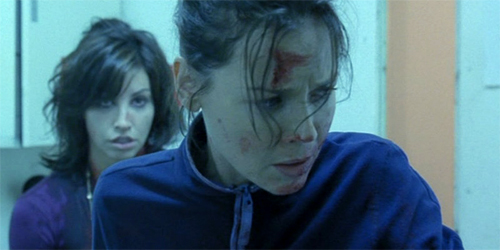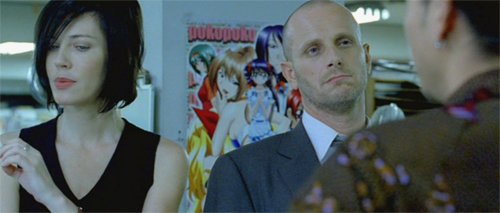Demonlover (2002)
Directed by: Olivier Assayas
Written by: Olivier Assayas
Starring: Chloë Sevigny, Connie Nielsen, Gina Gershon, Nao Ohmori

DEMONLOVER (2002)
Available on Blu-ray from Arrow Films
The internet, like most aspects of computer technology, is always a problem for film makers in one way or another. Whether it’s the hardware itself being laughable or online services looking more like those obnoxious ‘you wouldn’t steal a car’ DVD warnings they often have trouble resembling real life. So while a corporate thriller depicting a business trading in adult entertainment might seem edgy and modern, there’s always a kind of lingering artificial and dated vibe to the whole story. Still, leaving aside questions about how these increasingly fantastic websites actual operate this is a fairly engaging story about cut throat executives vying for authority. At least until its sense of reality starts to crumble elsewhere in the narrative.

The story opens with a high class plane ride in which cold and calculated legal deals are made while violent films play on repeat. This glossy and often sterile atmosphere permeates the entire story even as the corporations involved discuss their seedier projects. Their clean white hotel rooms and offices full of glass are a recurring visual throughout the story, hinting at the detached nature of the business at hand. Characters discuss real estate and pornography with the same mindset, it’s all just a case of making deals and turning a profit. As a central theme it’s an interesting idea, but while this imagery is consistent there are other story beats vying for attention.
Diane (Connie Nielsen) is a young executive at the upper echelons of a French firm trading with both Japan and America. However it’s soon very apparent that her methods of climbing the corporate ladder are pretty shady and during the opening flight she makes sure that her superior Karen (Dominique Reymond) is removed from the picture prior to a big deal. The eponymous Demonlover is a website dealing with adult animation and Diane wants to spearhead the company’s legal wrangling in Tokyo. But things are not what they first appear and as things progress it’s apparent very early on that she’s actually a plant working for a rival company to sabotage the deal from within.
This whole espionage angle is by far the most compelling aspect of the story, as it moves from the rivalry between Diane and her colleague Elise (Chloë Sevigny) and into more underhanded dealings. Things are complicated by the arrival of the American partners in the deal, which leads to the most gripping moments during a confrontation between Diane and her opposite number Elaine (Gina Gershon). They might be talking about eyebrow raising ideas like interactive torture websites and using eyebrow raising gadgets like Sony MiniDiscs… but the corporate spy storyline remains interesting. If only the third act panned out in a way that was as engrossing.

As Diane’s plan spirals out of control the consequences of her actions catch up with her. But here the film starts to falter, leading up to the most exciting of all sequences… a talky car ride in which Elise provides a lot of exposition to explain what’s been going on. There’s a lot of lost time and a lot of vague character motivation, which is about as interesting as all the endless talk about percentages and lawsuits in the first half of the story. The desire for control in both the world of business and in the realms of interactive websites might be a tantalising core idea, but during the finale these messages become muddled and it all just runs out of steam in an effort to throw Diane off the deep end.
The themes of identity and duality established early on with so many scenes shot through windows or reflected in glass are clouded, and the conclusion tries and give Elise a bigger part in the narrative than has been earned. With dialogue in both French and English (as well as Japanese) it’s a great idea to explore characters who work in two worlds or who are always wearing masks, but it’s all too shaky with an ending that offers more questions than answers. The film makers are clearly aiming for Videodrome, but even the idea of fantasy and reality merging is never really tackled in a way that feels focused. There’s a lot of suspense, but not so much pay-off.
A brief appearance from Nao Ohmori as a Japanese animation producer got my hopes up as I imagined this all going totally of the rails in the fashion of Takashi Miike’s most outlandish output. Moments in which characters seem to be desensitised to their work or the subject matter of the latest deal could really have gone anywhere. It’s also a story in which women are portrayed as both objects of abuse and as powerful business leaders. But there’s no concrete theme as it all comes to a head and a Diane’s mental confusion is likely to reflect the viewer’s rather than being anything more meaningful. Fans of ambiguous world cinema will certainly get a kick of out this mixture of sex, violence and clinical corporate drama, but ultimately it doesn’t come together as a fully formed experience.







Be the first to comment